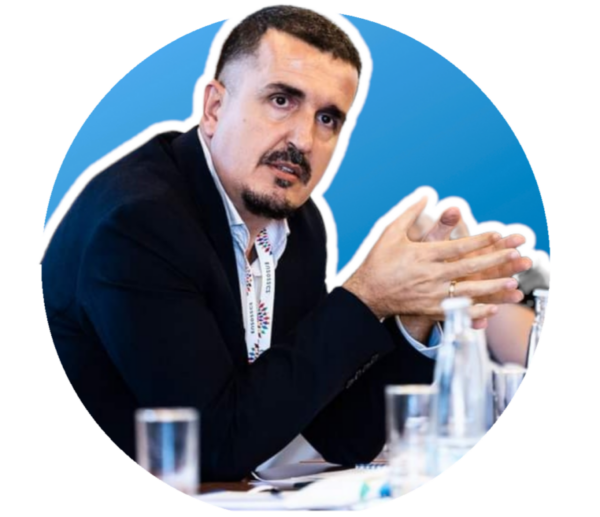In all this noise, the focus has not been on the challenges we will face this year – from constitutional changes to geopolitical realities. To achieve a two-thirds majority, the government must open a healthy and honest dialogue with the opposition.
Author: Xhelal Neziri
That the Balkans is a field of absurdity is also shown by the recent deterioration of relations between Sofia and Skopje. The physical attack on a member of the Bulgarian Club in Ohrid turned into a major interstate problem that also caused the withdrawal of the Bulgarian ambassador from Skopje. This incident is placed in the context of the issue of history before the Second World War, a problem that constantly appears in the relations between the two countries. The absurdity does not lie in the fact that history becomes an obstacle to integration into the European Union (EU), as a project for a more peaceful and progressive future. The biggest absurdity, however, is the current reality where two states are competing in the most uncultured way for Goce Dellçev, a historical figure who understood the world as a “field for cultured competition between peoples”. The 121st anniversary of his birth on February 4 will be celebrated at the height of tense relations between the two nations.
This problem would not be so serious if it did not risk reversing the veto for the integration of North Macedonia in the European Union (EU). And this at a time when political parties in Skopje are trying to find a formula to reach 80 deputies to change the Constitution so that ethnic Bulgarians become part of it. This commitment was made last year as part of the French Proposal, which lifted the blockade of Sofia, and serves as a guide for the implementation of the Good Neighbor Agreement signed in 2017.
Meanwhile, battles for the parliamentary majority are taking place in Skopje: the opposition is trying to get 61 deputies for early parliamentary elections, while the government is trying to secure 80 deputies for the constitutional changes.
By the end of the week, the entry of the Alliance for Albanians (AA) into the government coalition is expected to be formalized. In principle, there are no program obstacles, the problem is only in the allocation of resources. There are many small partners with big appetites, party and individual interests. Small political parties are constantly against the expansion of the government coalition. It makes government look like a kindergarten, where everyone fights for space and attention. It is understandable that with the entry of the AA into the government, their weight will not be the same, so they are doing everything to prevent this from happening.
The reaction to Afrim Gashi’s Alternative is somewhat understandable. As a party, it has the right to insist on the continued implementation of the agreement by which it became part of the government. Management with the health department is also a pillar of that agreement. This portfolio must now pass to the AA, so it will remain in only one ministry. It is politically correct to honor agreements, even if they are verbal. But in politics nothing is guaranteed. Political dynamics determine not only agreements, but also alliances. Now the government needs a stable parliamentary majority, while the SDSM-BDI agreement is also changing, when it comes to the division of departments and functions.
However, with only the deputies of the AA, it will not be possible to reach 80 deputies, which are needed for the constitutional changes. But the dilemma will be removed if a new majority will be created for the country to go to new parliamentary elections in a year when they are less necessary. Similarly, various political combinations and acrobatics that are only in the interest of certain parties or interest groups and are contrary to the interest of all citizens will disappear.
In all this noise, the focus has not been on the challenges we will face this year – from constitutional changes to geopolitical realities. To achieve a two-thirds majority, the government must open a healthy and honest dialogue with the opposition. As in the 90s, when a broad political and ethnic consensus was reached on the country’s strategic orientations – integration into NATO and the EU. This consensus is still possible today. There are ways and opportunities to convince VMRO-DPMNE to support the constitutional changes, but this should be the result of a serious process of negotiations, consultations and agreements. It is about the realization of the second strategic orientation, as a supra-party and supra-ethnic goal. There is no alternative to EU integration.
And, I will return again to the Balkan absurdity: Bulgaria is a member of the EU and NATO, but at the same time it is a European country where Russia has the greatest influence. Political instability and four consecutive election cycles, which have failed to produce a legitimate government, favor precisely Russian political installations in this country. President Rumen Radev from the BSP party, MEP Angel Xhambaski from VMRO-ND and Konstadin Konstadiov from “Vëzrazhdane” (Rebirth) are the loudest when it comes to using the veto again for Skopje. All these personalities and political subjects are connected by their sympathy for Russia and its president Vladimir Putin. Radev is the only legitimate figure who can represent his country abroad. He also has a great influence on the technical government. A casus beli (cause of war) will therefore be required in every possible incident. Putin’s goal is the same as in the case of Greece – preventing EU membership through a European country’s veto. He knows that in this case he is blocking two states with one veto.

